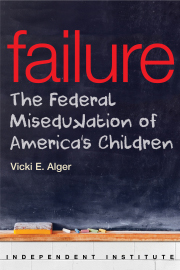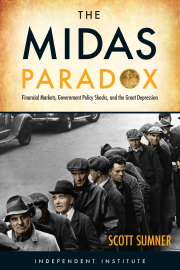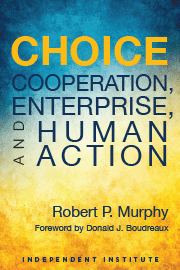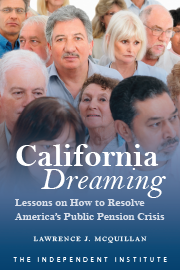Sam Staley • Sunday, January 21, 2018 •
 The Washington Post is now a stalwart of the national press corps, but, as the movie The Post makes clear, its status was not assured. Neither was the future of the Freedom of the Press in the wake of Daniel Ellsberg’s leaking of The Pentagon Papers in 1971 in what may be the most heralded case of federal whistleblowing.
The Washington Post is now a stalwart of the national press corps, but, as the movie The Post makes clear, its status was not assured. Neither was the future of the Freedom of the Press in the wake of Daniel Ellsberg’s leaking of The Pentagon Papers in 1971 in what may be the most heralded case of federal whistleblowing.
Ellsberg (Matthew Rhys, The Americans, Brothers and Sisters) was working for the Rand Corporation on an evaluation of U.S. progress in the Vietnam War. Official pronouncements about the war’s success were dramatically at odds with what actually was happening on the ground based on what Ellsberg observed. He subsequently leaked volumes of classified documents to The New York Times reporters Neil Sheehan, Hedrick Smith, and E.W. Kenworthy. The federal government sued the Times, attempting to shut down further reporting on the classified documents. Ultimately, the Supreme Court sided with The Times and upheld the principle of Freedom of the Press. The Times won the Pulitzer Prize for public service in 1972 for its reporting.
How does The Washington Post fit into the story? The Washington Post was hardly a major national player. Known more for its close personal relationships within the Kennedy and Johnson presidential administrations, the newspaper was certainly not in the same league as the Times journalistically. But the leak, and the controversy, came at a pivotal time in the Post’s corporate and journalistic evolution. While the Times scooped the Post (and everyone else), the nation’s capital newspaper ended up playing a critical role in the fight for the First Amendment. When the federal government ordered the Times to stop publishing articles based on the Pentagon Papers, the Post continued to report on the source material using an independently secured copy. The federal government issued a cease and desist order to the Post, too. The two cases were consolidated under The New York Times Co. vs United States (403 U.S. 713 (1971).
Robert Higgs • Monday, January 15, 2018 •
 Many anti-immigrationists display a remarkable confidence in their ability to forecast how immigrants will act for many years into the future. So, for example, the nativists often allege that if, say, Mexicans are permitted to enter the USA, they will sooner or later vote for governmental measures to plunder the current residents and redistribute the loot to themselves. What gives the nativists such powers of divining the future, especially when they have no special knowledge of social science or ethnic history to work with?
Many anti-immigrationists display a remarkable confidence in their ability to forecast how immigrants will act for many years into the future. So, for example, the nativists often allege that if, say, Mexicans are permitted to enter the USA, they will sooner or later vote for governmental measures to plunder the current residents and redistribute the loot to themselves. What gives the nativists such powers of divining the future, especially when they have no special knowledge of social science or ethnic history to work with?
It might be worthwhile for people to consider how the “experts” have fared over the past couple of centuries in making such forecasts. The main conclusion one would be compelled to reach from such a consideration is that the experts have an almost perfect record of poor forecasts, indeed of many forecasts that were the opposite of what actually came about in the fullness of time. Again and again, the experts failed to see the extent to which the strangers would assimilate into the economy, the society, and the culture. Indeed, members of the groups regarded as least likely to assimilate, such as the Chinese and Japanese, turned out to do so as well as, if not better than, members of groups considered more likely to blend in.
Lawrence McQuillan • Friday, January 12, 2018 •

Feeding America is a network of 200 food banks and 60,000 food pantries and meal programs that helps to feed 46 million Americans annually, including 12 million children and 7 million seniors. The network fights hunger and poor nutrition by working with manufacturers, distributors, retailers, food service companies, and farmers to gather food before it is wasted and distribute it to local food banks across the country.
One concern that a new CEO of Feeding America heard regularly from local food bank directors was that they often received food that they did not want because they already had sufficient inventories or local customers would not take it. Food distribution decisions were made at the central office, and mismatches occurred frequently regarding what local food banks wanted and what they received. Dispersed local food banks had knowledge of their food priorities, but the central distributor acted independently of those priorities.
Raymond March • Thursday, January 11, 2018 •
 A recent survey of physician wait times in the United States found the average wait time for a new patient to see a physician in 15 metropolitan areas has increased 30 percent since 2014. This statistic includes an average wait time of over two months to get a physical in Boston, a month to get a heart evaluation in Washington, and one month for a skin exam anywhere in the nation. With a current U.S. shortage of 61,000 to 94,700 physicians, longer wait times are likely to continue.
A recent survey of physician wait times in the United States found the average wait time for a new patient to see a physician in 15 metropolitan areas has increased 30 percent since 2014. This statistic includes an average wait time of over two months to get a physical in Boston, a month to get a heart evaluation in Washington, and one month for a skin exam anywhere in the nation. With a current U.S. shortage of 61,000 to 94,700 physicians, longer wait times are likely to continue.
Fortunately for patients tired of waiting for swift medical attention, health apps are providing solutions.
Health apps use smartphone technology to provide medical assistance or access to medical professionals. More than 318,000 health apps are currently available, and according to a national survey, 65 percent of smartphone users downloaded at least one health app and used it daily.
Randall Holcombe • Thursday, January 11, 2018 •
 Most Americans recognize that while the American Founders established a constitutionally limited government of enumerated powers, twenty-first century American government has expanded well beyond the boundaries our Founders designed. Some are unhappy about this; others believe it is entirely appropriate, thinking that our advanced post-industrial society needs much more government involvement than the mostly-agrarian nation did when it was founded.
Most Americans recognize that while the American Founders established a constitutionally limited government of enumerated powers, twenty-first century American government has expanded well beyond the boundaries our Founders designed. Some are unhappy about this; others believe it is entirely appropriate, thinking that our advanced post-industrial society needs much more government involvement than the mostly-agrarian nation did when it was founded.
Regardless of whether one favors or opposes the massive expansion in the size and scope of government, the reason government has been able to escape the bounds of the constitutional constraints designed by the Founders is the acceptance of the ideology of Progressive Democracy.
Mary Theroux • Tuesday, January 9, 2018 •
 The recent federal tax cut is creating a lot of fear and angst that a quick historical survey would go far to allay.
The recent federal tax cut is creating a lot of fear and angst that a quick historical survey would go far to allay.
Consider, for example, this recent opinion piece by two officials of the Council of Nonprofits, “Nonprofits Must Move Swiftly to Fight for Sound Public Policies.” Characterizing the tax bill as unleashing a “destructive tsunami,” they go on to predict:
as governments at all levels are forced to cut spending, more work will fall on nonprofits to help people hurt by the spending reductions. Expect nonprofits to have to seek more money from foundations to cover those costs—think of it as a new tax on philanthropy to subsidize decisions of politicians.
Swamped by the legend that World War II ended the Great Depression are the facts that the U.S. domestic economy remained mired in depression until 1946—after the war had ended. The single measure by which many conclude that the Depression ended with the war is unemployment—which not surprisingly declined from a high of 9-15% in 1940, to 1.2% in 1944, when 16 million Americans were “employed” by the military. Those left at home continued to suffer low standards of living including rationing of almost everything, the pain of which was likely eased by the “spirit” of shared privation for the war effort.
Randall Holcombe • Wednesday, January 3, 2018 •
 As I read about the demonstrations in Iran, my thoughts turn to conversations I’ve had with Iranian citizens over the past several years. From 2011-2016 I taught in a week-long summer program on public choice put on in the Republic of Georgia by the New Economic School headquartered in Tbilisi, Georgia. The program attracted students from between 25 and 35 different countries each year, and every year some students were from Iran.
As I read about the demonstrations in Iran, my thoughts turn to conversations I’ve had with Iranian citizens over the past several years. From 2011-2016 I taught in a week-long summer program on public choice put on in the Republic of Georgia by the New Economic School headquartered in Tbilisi, Georgia. The program attracted students from between 25 and 35 different countries each year, and every year some students were from Iran.
I always enjoyed talking with the Iranian students, and hearing about their views on life in Iran, and their government. While I can’t claim that the students in attendance were a random selection of Iranians, one thing that came through very clearly in talking with them was a general dissatisfaction with their oppressive government.
News coverage of the demonstrations notes Iranian leaders blaming the demonstrations on foreign interference by Iran’s enemies, including Saudi Arabia, Israel, and of course the United States. While I have no doubt that political leaders in those (and other) countries would be happy to promote demonstrations against the Iranian government, I also have no doubt, from talking to Iranian citizens over the past several years, that the main source of unrest comes from Iranian citizens, not foreign governments.
The Iranians I talked with did not like the oppressive social policies in Iran, nor the heavy hand the Iranian government was playing in the economy. They were concerned about government monitoring of their activities, and potential penalties that might be imposed on them for stepping out of line in any way.
Randall Holcombe • Thursday, December 21, 2017 •
 One of the most important factors that generate prosperity is rule of law, which means having an objective set of laws that apply to everyone. Rule of law provides the incentive for people to engage in productive activity so they can prosper themselves by producing value for others.
One of the most important factors that generate prosperity is rule of law, which means having an objective set of laws that apply to everyone. Rule of law provides the incentive for people to engage in productive activity so they can prosper themselves by producing value for others.
In the absence of rule of law, institutions favor some people over others, and entrepreneurial individuals have the incentive to look for ways to join the favored group and to benefit themselves through activities that impose costs on others. Rule of law removes the opportunity to prosper through connections and cronyism, and creates opportunities to prosper through mutually-advantageous exchange.
Alvaro Vargas Llosa • Wednesday, December 20, 2017 •
 If we want everything to remain the same, everything must change. These famous words from The Leopard, Lampedusa’s masterpiece of social upheaval in Sicily during the Italian unification, might as well have been inspired by Brexit, to judge by the first phase of the negotiations between London and the European Union, which have finally produced an agreement.
If we want everything to remain the same, everything must change. These famous words from The Leopard, Lampedusa’s masterpiece of social upheaval in Sicily during the Italian unification, might as well have been inspired by Brexit, to judge by the first phase of the negotiations between London and the European Union, which have finally produced an agreement.
The terms of the agreement are these: London will pay the EU about 40 billion pounds; Europeans living in British territory can stay (and vice versa); and the border between Northern Ireland, which belongs to the United Kingdom, and Ireland, which belongs to the EU, will be soft. It remains to define what “soft” means, but since London has agreed to “align” its norms with those of the union to ensure that there will not be a “hard” border, clearly the outcome will resemble the current situation.
The second phase of the negotiations, soon to start, will focus on economic exchanges between the two parties.
There are two options. One is the Norwegian way: in exchange for access to the single market (its official name is “internal market”), London agrees to make economic contributions, adopt European norms, and maintain the four freedoms, which include the free movement of people. The other is the Canadian way: London and Brussels sign a free trade agreement that lifts barriers to goods but not services.
David Theroux • Monday, December 18, 2017 •
 From the satirical vaults of 2005 by an unknown author who we wish we could credit, but most likely someone who was working for the government:
From the satirical vaults of 2005 by an unknown author who we wish we could credit, but most likely someone who was working for the government:
Scientists have discovered the heaviest element yet known to science. The new element, Governmentium (symbol=Gv), has one neutron, 25 assistant neutrons, 88 deputy neutrons, and 198 assistant deputy neutrons, giving it an atomic mass of 312. These 312 particles are held together by forces called morons, which are surrounded by vast quantities of lepton-like particles called peons.
Since Governmentium has no electrons, it is inert. However, it can be detected because it impedes every reaction with which it comes into contact. A tiny amount of Governmentium can cause a reaction that would normally take less than a second, to take from 4 days to 4 years to complete.
Governmentium has a normal half-life of 2 to 6 years. It does not decay, but instead undergoes a reorganization in which a portion of the assistant neutrons and deputy neutrons exchange places. In fact, Governmentium’s mass will actually increase over time, since each reorganization will cause more morons to become neutrons, forming isodopes. This characteristic of moron promotion leads some scientists to believe that Governmentium is formed whenever morons reach a critical concentration. This hypothetical quantity is referred to as critical morass.
When catalyzed with money, Governmentium becomes Administratium (symbol=Ad), an element that radiates just as much energy as Governmentium, since it has half as many peons but twice as many morons.
H/T: Paul J.H. Schoemaker
 The Washington Post is now a stalwart of the national press corps, but, as the movie The Post makes clear, its status was not assured. Neither was the future of the Freedom of the Press in the wake of Daniel Ellsberg’s leaking of The Pentagon Papers in 1971 in what may be the most heralded case of federal whistleblowing.
The Washington Post is now a stalwart of the national press corps, but, as the movie The Post makes clear, its status was not assured. Neither was the future of the Freedom of the Press in the wake of Daniel Ellsberg’s leaking of The Pentagon Papers in 1971 in what may be the most heralded case of federal whistleblowing.























 Many anti-immigrationists display a remarkable confidence in their ability to forecast how immigrants will act for many years into the future. So, for example, the nativists often allege that if, say, Mexicans are permitted to enter the USA, they will sooner or later vote for governmental measures to plunder the current residents and redistribute the loot to themselves. What gives the nativists such powers of divining the future, especially when they have no special knowledge of social science or ethnic history to work with?
Many anti-immigrationists display a remarkable confidence in their ability to forecast how immigrants will act for many years into the future. So, for example, the nativists often allege that if, say, Mexicans are permitted to enter the USA, they will sooner or later vote for governmental measures to plunder the current residents and redistribute the loot to themselves. What gives the nativists such powers of divining the future, especially when they have no special knowledge of social science or ethnic history to work with?
 A
A  Most Americans recognize that while the American Founders established a constitutionally limited government of enumerated powers, twenty-first century American government has expanded well beyond the boundaries our Founders designed. Some are unhappy about this; others believe it is entirely appropriate, thinking that our advanced post-industrial society needs much more government involvement than the mostly-agrarian nation did when it was founded.
Most Americans recognize that while the American Founders established a constitutionally limited government of enumerated powers, twenty-first century American government has expanded well beyond the boundaries our Founders designed. Some are unhappy about this; others believe it is entirely appropriate, thinking that our advanced post-industrial society needs much more government involvement than the mostly-agrarian nation did when it was founded. The recent federal tax cut is creating a lot of fear and angst that a quick historical survey would go far to allay.
The recent federal tax cut is creating a lot of fear and angst that a quick historical survey would go far to allay. As I read about the demonstrations in Iran, my thoughts turn to conversations I’ve had with Iranian citizens over the past several years. From 2011-2016 I taught in a week-long summer program on public choice put on in the Republic of Georgia by the
As I read about the demonstrations in Iran, my thoughts turn to conversations I’ve had with Iranian citizens over the past several years. From 2011-2016 I taught in a week-long summer program on public choice put on in the Republic of Georgia by the  One of the most important factors that generate prosperity is rule of law, which means having an objective set of laws that apply to everyone. Rule of law provides the incentive for people to engage in productive activity so they can prosper themselves by producing value for others.
One of the most important factors that generate prosperity is rule of law, which means having an objective set of laws that apply to everyone. Rule of law provides the incentive for people to engage in productive activity so they can prosper themselves by producing value for others. If we want everything to remain the same, everything must change. These famous words from The Leopard, Lampedusa’s masterpiece of social upheaval in Sicily during the Italian unification, might as well have been inspired by Brexit, to judge by the first phase of the negotiations between London and the European Union, which have finally produced an agreement.
If we want everything to remain the same, everything must change. These famous words from The Leopard, Lampedusa’s masterpiece of social upheaval in Sicily during the Italian unification, might as well have been inspired by Brexit, to judge by the first phase of the negotiations between London and the European Union, which have finally produced an agreement. From the satirical vaults of 2005 by an unknown author who we wish we could credit, but most likely someone who was working for the government:
From the satirical vaults of 2005 by an unknown author who we wish we could credit, but most likely someone who was working for the government: